Are We Training Our Replacements, or Just Sharpening Our Tools?

Let’s be honest. If you’re a developer, the topic of Artificial Intelligence probably sparks a cocktail of emotions. Excitement? Sure. Curiosity? Definitely. A tiny, creeping sense of dread that you might be meticulously crafting the very algorithms that will eventually render your job obsolete, forcing you into a premature career change involving artisanal coffee? Maybe.
The narrative is pervasive:
AI is coming for our jobs, and developers, the architects of this digital revolution, might be ironically first on the chopping block.
We hear whispers of AI writing flawless code, debugging complex systems, and even designing entire applications. Is it time to dust off that ”Plan B: Become a Barista” folder we all secretly have? Recently, my team (shoutout to Lei, Albin, and Anton!) and I decided to dive into this very question. We weren’t content with just speculating; we wanted data. Leveraging the insights from the extensive Stack Overflow Developer Survey, we explored how developers are actually using AI tools and, crucially, how they feel about the potential threat AI poses to their careers.
Our initial, slightly tongue-in-cheek hypothesis, born perhaps from late-night coding sessions fueled by caffeine and existential doubt, was: Is there a connection between developers actively using AI tools and those lying awake at night, sweating over the possibility that they’re basically just teaching their successor the ropes?
Are the most avid AI adopters also the ones secretly packing that emergency barista kit? The answers, as we discovered, were quite revealing and, frankly, a bit surprising. So, grab your beverage of choice (coffee, tea, or existential dread smoothie), and let’s unpack what the data says about the state of AI in the development world.
The Pulse of the Developer Community: AI Usage and Threat Perception
Before diving into the deep end, let’s get a baseline. How widespread is AI tool adoption among developers right now, and what’s the general feeling about AI as a potential job threat? Our analysis of the Stack Overflow data painted an interesting picture.
Who’s Using AI Tools?
When asked about their use of AI tools for development work (Cursor, GitHub Copilot, ChatGPT for coding tasks, etc.), the responses showed a landscape in transition:
The Adopters (57,6%): Roughly half of all devs reported currently using AI tools in their workflow.
The Curious Planners (12.8%): A significant chunk aren’t using them yet, but they plan to start soon.
The Holdouts (22,7%): are not using AI tools and currently have no plans to do so.
(Missing/Undefined made up the remaining 6.9%)
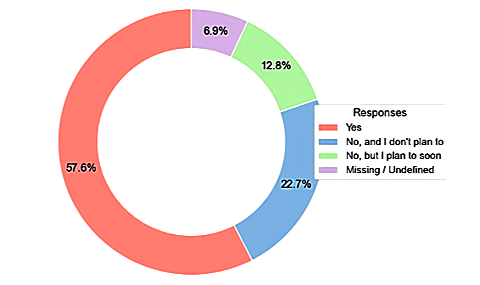
So, somewehwre 70% of developers are either already using AI tools or intending
to jump in shortly. That’s a substantial portion, indicating a clear and growing interest.
But Are They Scared? The AI Threat Perception
Now, the million-dollar (or perhaps, your salary’s worth) question: Do developers see AI as a threat to their livelihood?
Feeling Secure (46.5%): Almost half of the developers surveyed stated they do not perceive AI as a threat.
Feeling Threatened (8,2%): A smaller, but not insignificant, group does see AI as a potential threat.
On the Fence (13,6%): developers are unsure about the implications of AI for their careers.
(Missing/Undefined accounted for 31,7%)
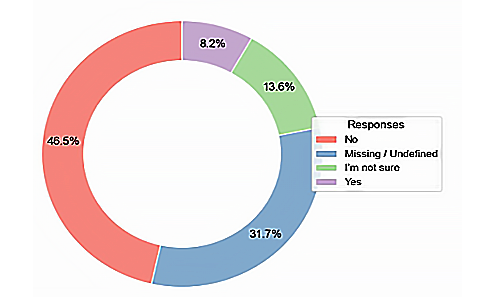
This initial snapshot suggests more optimism (or perhaps comfortable indifference?) than outright fear. The ”No Threat” camp is substantially larger than the ”Yes Threat” camp. However, the large ”I’m not sure” group highlights the uncertainty still surrounding AI’s long-term impact.
Does Age Play a Role? (Spoiler: Not as Much as You Might Think)
We also sliced the data by age group, wondering if younger, perhaps more digitally native developers, had different usage patterns or threat perceptions compared to their more experienced counterparts.
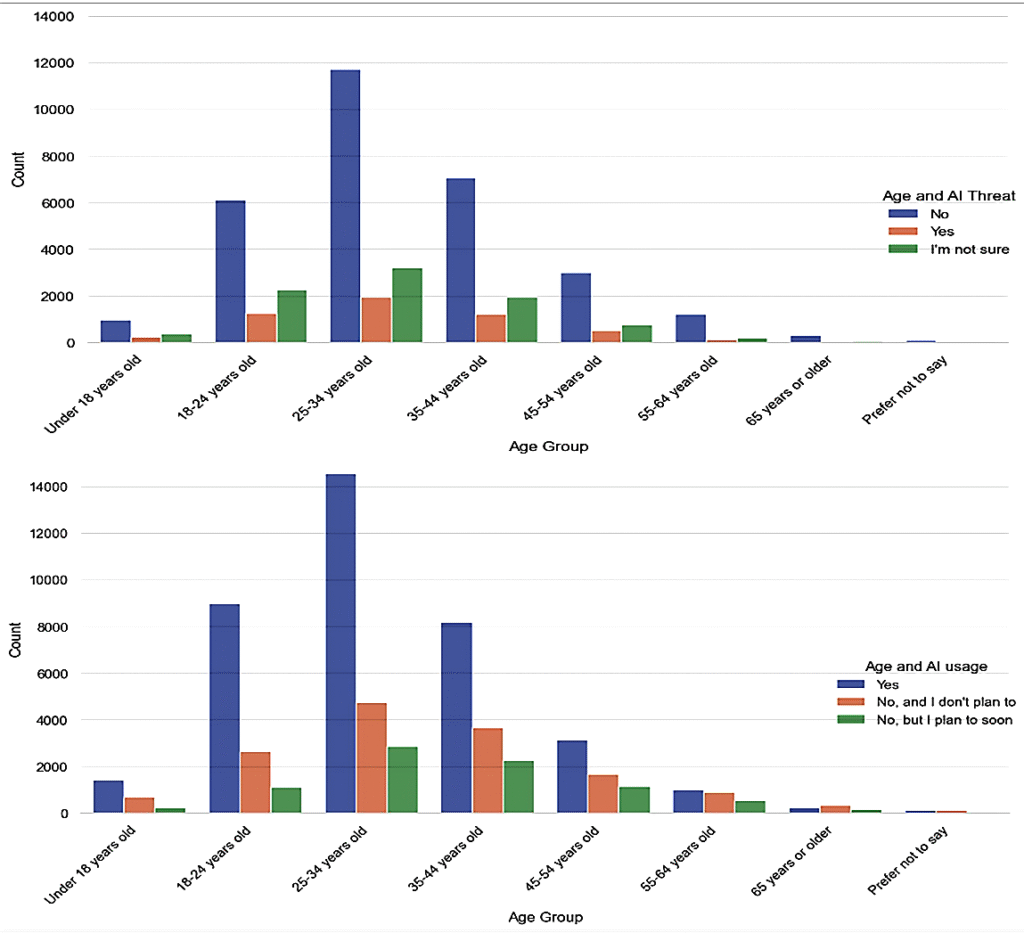
The charts revealed that younger demographics (especially the 25-34 age bracket, which is often the largest in these surveys) showed higher absolute numbers for both using AI and planning to use it soon. They also had higher counts in the ”No Threat” category, but also noticeable numbers in the ”Yes Threat” and ”I’m not sure” groups.
However, when we performed statistical tests (specifically calculating Cramér’s V to measure the strength of association), we found:
Age vs. AI Usage (AISelect): Result ≈ 0.11 (Weak Association). Yes, younger developers seem slightly more inclined to use or plan to use AI, but age isn’t a major determining factor.
Age vs. AI Threat Perception (AIThreat): Result ≈ 0.06 (Very Weak Association). Age has almost no statistical bearing on whether a developer perceives AI as a threat. The anxieties (or lack thereof) are spread across generations.
This suggests that the AI question transcends age; it’s a universal consideration within the profession.
The Big Reveal: The Surprising Link Between Using AI and Fearing It
Okay, back to our main hypothesis: Are the developers using AI the ones secretly panicking? Our statistical analysis delivered a clear, resounding answer.
We ran a Chi-Squared test, which confirmed a statistically significant relationship between the variables (p-value = 0, meaning the results are highly unlikely to be due to random chance). Then, we calculated Cramér’s V specifically for the relationship between AI tool usage (AISelect) and AI threat perception (AIThreat).
The result? Cramér’s V ≈ 0.55 In statistical terms, a Cramér’s V value above 0.5 indicates a strong association between the two variables.
But what does this mean? To understand the direction of this strong relationship, we looked at a correlation heatmap, visualizing the counts for each combination of answers. The heatmap revealed the story loud and clear: The largest single group (a whopping 24,812 respondents) were developers who use AI tools AND simultaneously stated they do not see AI as a threat.
The second largest group (14,837 respondents) were those who don’t use AI and don’t plan to, and also don’t see it as a threat. Among those who do perceive AI as a threat (the ”Yes” row in the heatmap), the largest segment (7,120) still uses AI tools. Another significant portion (4,396) plans to use them soon. Only a small fraction (992) of those who fear AI are resolute non-users.
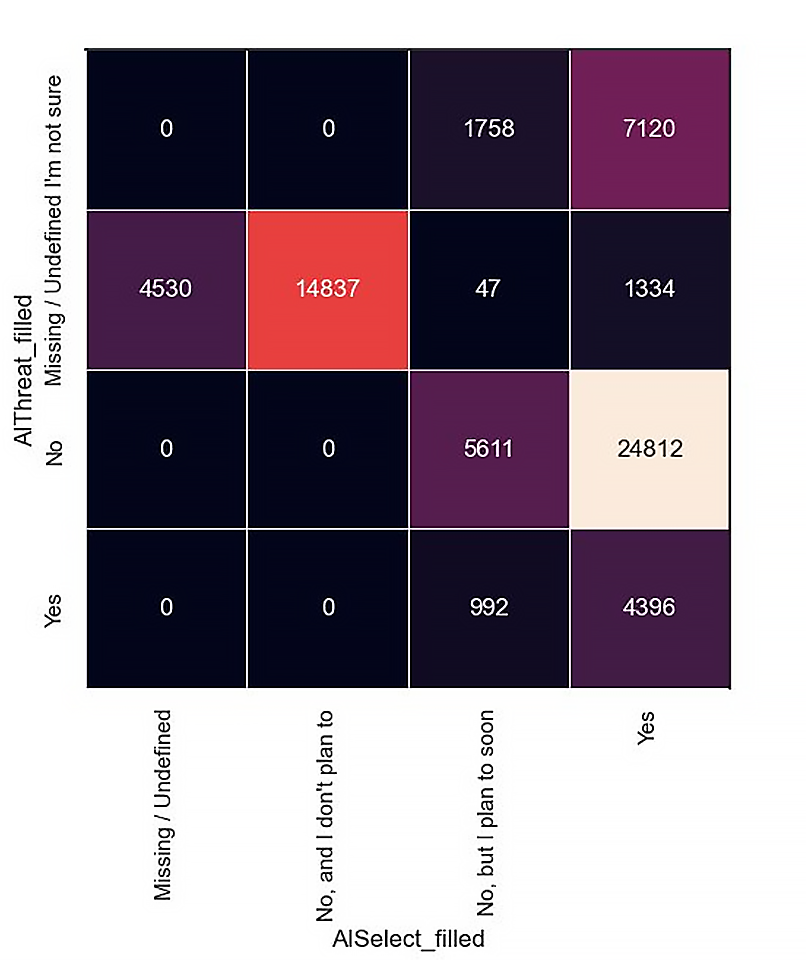
The Conclusion is Inescapable
Far from being the most anxious, developers who actively use AI tools are overwhelmingly the ones who feel least threatened by it. Our initial ”barista backup plan” hypothesis was, for the most part, busted. It seems familiarity, in this case, doesn’t breed contempt, but confidence. Those who are hands-on with AI likely see its current limitations, understand its potential as an assistant rather than a replacement, and feel empowered by the productivity gains it offers. The fear seems more concentrated among those who aren’t using it or are perhaps only observing from a distance.
Okay, They’re Not Panicking (Mostly). But How Are Developers Using AI? The survey told us if developers are using AI, but not necessarily how. Based on the current landscape of AI development tools and anecdotal evidence, we can infer some common use cases:
Code Completion & Generation: Tools like Cursor, GitHub Copilot suggest lines or entire blocks of code based on context and comments. This can significantly speed up boilerplate or repetitive coding tasks.
Debugging Assistance: AI can help identify potential bugs, suggest fixes, or explain error messages in plain language.
Code Explanation & Documentation: Pasting a complex code snippet into an AI like ChatGPT can yield surprisingly good explanations of what it does, aiding understanding and documentation.
Learning & Exploration: Developers use AI to quickly learn new languages, frameworks, or concepts by asking questions and getting illustrative code examples.
Refactoring & Optimization: AI tools are increasingly capable of suggesting ways to refactor code for better readability, performance, or adherence to best practices.
Test Generation: AI can assist in writing unit tests or suggesting test cases, helping to improve code coverage and reliability.
Essentially, AI is becoming a versatile ”pair programmer” or assistant, handling grunt work, providing quick answers, and allowing developers to focus on higher-level problem-solving and design.
Gazing into the Crystal Ball: How Much Code Will AI Write by 2025?
This is where we move from survey data to informed speculation. Predicting the exact percentage of code generated by AI in the near future is tricky, but the trends are suggestive.
Growing Adoption: The 12.8% of developers planning to adopt AI tools soon (from the Stack Overflow survey) indicates momentum. As tools improve and become more integrated into IDEs, adoption rates are likely to climb further.
Industry Projections: While hard numbers vary, many analysts predict a significant increase. Some suggest that by 2025 or shortly thereafter, AI could be involved in generating or assisting with a substantial portion (perhaps anywhere from 10% to even 50% or more, depending on the definition) of new code, especially for common patterns and tasks.
Focus Shift: This doesn’t necessarily mean less human coding overall, but rather a shift in what humans code. If AI handles more boilerplate, developers can write more complex, business-critical logic or focus on system architecture and integration.
The Million-Line Question: Does more AI-generated code mean fewer developer jobs? Or does it mean developers become more productive, tackling bigger challenges? The data and expert opinions (which we’ll get to) lean towards the latter. The demand for software isn’t shrinking; if anything, it’s exploding. AI might be the force multiplier needed to meet that demand.
Enter ”Vibe Coding”: Programming by… Feeling?
As AI’s role evolves, new paradigms for interacting with it emerge. One fascinating, and somewhat controversially named, concept is ”Vibe Coding,” popularized by AI researcher Andrej Karpathy (formerly of Tesla and OpenAI).
What on Earth is Vibe Coding?
Forget meticulously typing out every line of syntax. Karpathy describes a future (and partially present) scenario where developers operate at a higher level of abstraction. Instead of writing explicit instructions (which he likens to ”System 2” thinking – slow, deliberate, effortful), developers communicate the intent, the goal, the desired outcome – the ”vibe” – and let the AI handle the low-level implementation details (akin to ”System 1” thinking – fast, intuitive, automatic).
Imagine telling your AI assistant: ”Okay, build me a user authentication module. Standard stuff: email/password login, Google OAuth option, password reset flow. Make it secure, use modern best practices, and integrate it with our existing React frontend and PostgreSQL database. Oh, and make the UI clean and minimalist.”
The AI, armed with vast knowledge of code patterns, libraries, and security practices, would then generate the necessary code, configuration files, and potentially even basic UI components. The developer’s role shifts towards prompt engineering, reviewing, testing, refining, and integrating the AI’s output, rather than writing everything from scratch.
The Good Vibes: Why Vibe Coding Could Be Awesome
Proponents see numerous potential benefits:
Massive Speed Increase: Generating boilerplate and common components could become near-instantaneous.
Focus on High-Level Problems: Developers spend less time on syntax and more on architecture, user experience, and business logic.
Increased Accessibility: Could potentially lower the barrier to entry for software creation, allowing domain experts with less traditional coding experience to build tools.
Rapid Prototyping: Quickly iterate on ideas by generating functional prototypes based on high-level descriptions.
The Bad Vibes: Potential Pitfalls and Concerns
However, the concept also raises significant concerns:
Loss of Fundamental Understanding: If developers aren’t writing the low-level code, will they still understand how it works? What happens when the AI’s output is subtly wrong or needs deep debugging?
Debugging Nightmares: Debugging opaque, AI-generated code could be significantly harder than debugging human-written code, especially if the AI’s reasoning isn’t clear.
”Messy Code” Amplified? Remember our team’s joke about messy code being job security? What if the AI, trained on mountains of existing (often imperfect) code, generates code that works but is poorly structured, hard to maintain, or subtly insecure? The ”vibe” might be right, but the execution flawed.
Over-Reliance and Skill Atrophy: Could crucial programming skills atrophy if developers become overly reliant on AI assistants?
Security Implications: Can we trust AI to consistently generate secure code, especially for critical applications? How do we validate it effectively?
The Vibe Check:
Vibe Coding represents a fascinating potential future, moving developers further up the abstraction ladder. However, it underscores a critical point: understanding the fundamentals remains paramount. You can only effectively guide, review, and debug AI-generated code if you deeply understand the underlying principles of programming, architecture, and the specific domain you’re working in. You need to know what to ask for, how to evaluate the result, and how to fix it when the vibe isn’t quite right.
What Do the Experts Think? Giants Weigh In
It’s not just us and Stack Overflow respondents pondering this. Industry leaders are actively navigating the AI wave.
Andrej Karpathy (The Vibe Proponent): Karpathy himself sees AI assistants like Copilot as the first step towards this ”System 1” coding future. He envisions AI handling the tedious parts, freeing up human ingenuity for the truly novel and complex aspects of software development. He doesn’t see it as replacement, but as significant augmentation. (Source: Your provided LinkedIn/Medium links)
Arvind Krishna (IBM CEO): In contrast to extreme hype, IBM’s CEO takes a more measured view. He stated that AI is ”light years away” from replacing developers entirely. He sees AI excelling at specific tasks (like COBOL code translation) but lacking the broader reasoning, creativity, and domain understanding required for complex software engineering. For him, AI is a powerful productivity tool, an augment, but not a substitute for human expertise. (Source: Your provided Computer Sweden link)
Meta (Facebook): Reports suggest Meta is actively exploring how AI can take over more coding tasks, potentially replacing some human effort with AI-driven development and testing as early as this year. Their focus seems to be on boosting efficiency and automating routine tasks, allowing human engineers to focus on more innovative work. This reflects a practical approach: use AI where it makes sense to improve productivity, rather than aiming for wholesale replacement yet. (Source: Your provided Omni link)
The Consensus? While perspectives vary in emphasis, a common thread emerges: Augmentation over immediate replacement. Experts see AI dramatically changing how developers work, automating routine tasks and boosting productivity, but the need for human oversight, critical thinking, architectural design, and deep problem-solving skills remains crucial. The job is evolving, not vanishing.
So, Are We Developers Headed for the Dinosaur Museum?
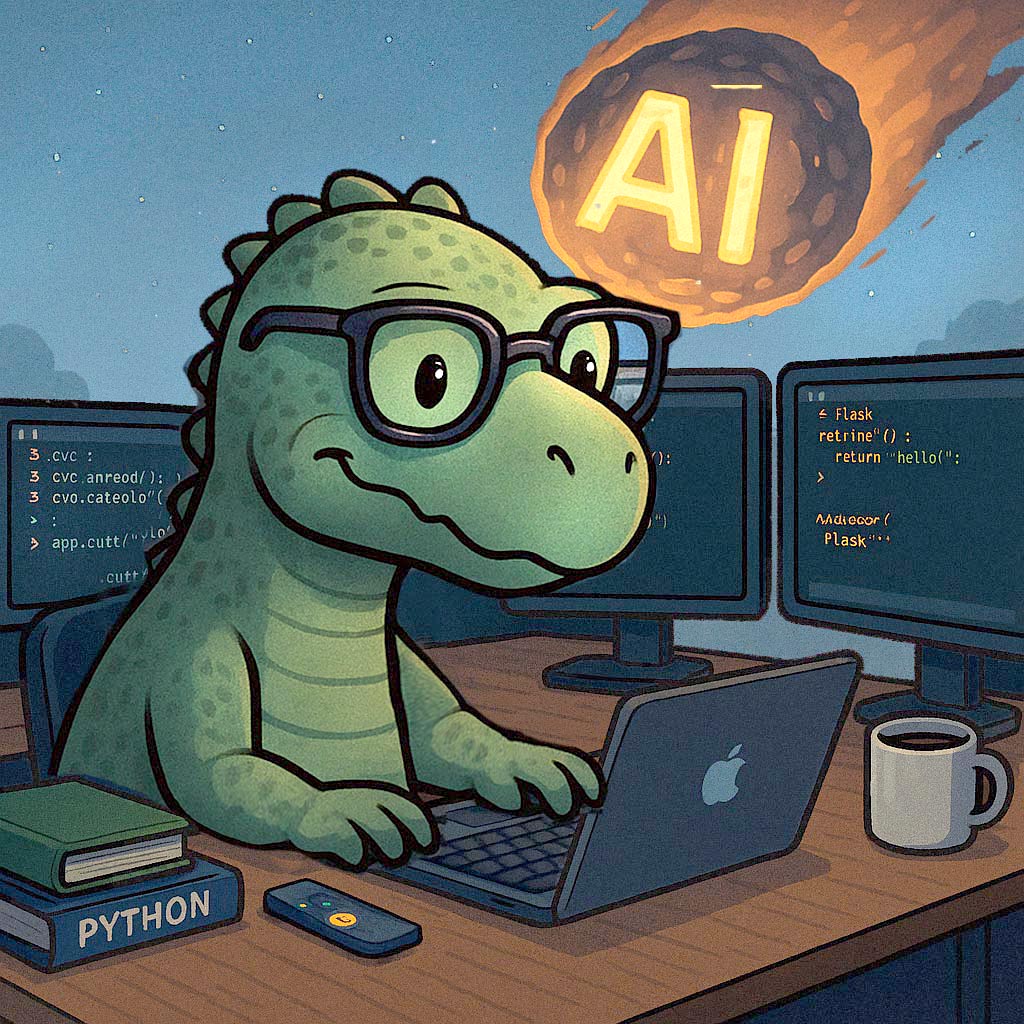
Let’s circle back to the existential dread. Based on the data, the expert opinions, and the evolving nature of AI tools, is the ”developer dinosaur” scenario realistic?
All signs point to NO.
The Data Doesn’t Show Widespread Panic: As our analysis revealed, developers actively using AI are the least likely to fear it. They see it as a tool.
AI is an Augment, Not (Yet) Autonomy: Current AI excels at pattern matching and executing well-defined tasks based on its training data. It struggles with true novelty, deep contextual understanding, complex system architecture, nuanced user requirements, and the creative problem-solving that defines much of software engineering. History Repeats (Sort Of): Development has always been about increasing levels of abstraction. We moved from machine code to assembly, to high-level languages, to powerful frameworks and libraries. Each step automated previous tasks, but didn’t eliminate programmers; it empowered them to build more complex things faster. AI assistants are arguably the next step in this evolution. The Demand is Insatiable: The world needs more software, not less. AI might help us meet that demand more efficiently, but the need for skilled humans to guide, design, validate, and maintain these systems is unlikely to disappear.
The role of the developer is undoubtedly changing. Raw coding proficiency might become slightly less critical compared to skills like:
Prompt Engineering: Effectively instructing AI.
System Design & Architecture: Planning how complex systems fit together.
Critical Evaluation: Assessing the quality, security, and correctness of AI-generated code.
Debugging & Integration: Fixing AI outputs and making them work within larger systems.
Domain Expertise: Understanding the business context and user needs.
Adaptability & Learning: Continuously keeping up with evolving AI tools and techniques.
The developer of the future might write less boilerplate code but spend more time orchestrating AI, validating its output, and solving the unique, complex problems that AI cannot (yet) handle.
So, what’s the takeaway?
From our dive into the Stack Overflow data and the swirling vortex of AI hype?
AI is Here to Stay, and It’s a Tool: A growing number of developers are using AI, and crucially, those who do are largely optimistic about its role. It’s being integrated as a powerful assistant, a co-pilot in the complex journey of software development.
The Fear is Real, But Perhaps Misplaced: While uncertainty exists (that ~32% ”I’m not sure” group is significant), the data strongly suggests that hands-on experience with AI alleviates rather than exacerbates fears of replacement. The biggest threat isn’t the AI itself.
Adapt or Be Left Behind (by other humans): This might be the most critical conclusion. While AI is unlikely to make developers obsolete wholesale in the near future, it is raising the bar for productivity and efficiency. The programmer who refuses to learn and leverage AI tools may find themselves outpaced and, eventually, potentially replaced – not by an AI, but by another programmer who does use AI effectively.
Vibe Coding is Cool, But Fundamentals are King: Concepts like Vibe Coding offer exciting glimpses into the future, but they only work if the human guiding the AI truly understands the underlying principles. You can’t effectively ”vibe” your way to a robust, secure, and maintainable application without a solid grasp of programming logic, data structures, algorithms, system architecture, and the specific platforms and frameworks you’re using. It’s a powerful abstraction layer, but abstraction without foundation is fragile.
In Conclusion:
The robot uprising isn’t scheduled for next Tuesday’s sprint planning. AI is transforming software development, presenting incredible opportunities for those willing to adapt. It promises to automate the mundane, accelerate development cycles, and free up human developers to tackle more interesting and challenging problems.
Should you be learning AI tools? The data suggests yes. Should you abandon learning programming fundamentals? Absolutely not. The future likely belongs to the developer who can seamlessly blend their own expertise with the capabilities of AI, becoming a sort of ”centaur developer” – part human ingenuity, part AI efficiency.
So, maybe keep that espresso machine handy. Not for a backup career, but to fuel the exciting, challenging, and increasingly AI-assisted future of software development. The journey is just beginning. If you’ve read this far, I’d like to thank you. Please leave a comment, I appreciate it. See you soon.

